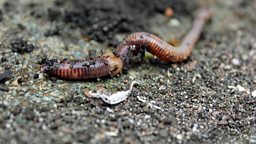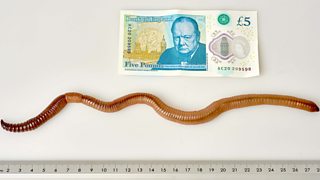Several surprising facts about worms
Alison Woollard belongs to an exclusive club of worm scientists. For days on end she does nothing but look at worms’ tails through a microscope in order map genetic abnormalities. You can hear her talking about her wriggly co-workers on and if this piques your curiosity, read our astonishing worm facts...

Humble beginnings
Earthworms hatch from egg cases that look like tiny lemons. Young worms hatch from their cocoons in three weeks to five months, and they’ll stay put if the soil or weather conditions are bad.
What’s in a name?
One worm, C. elegans, is so called because it moves it's curves in an elegant way. Think Strictly salsa contestant in a vegtable patch. Common names for the earthworm include "dew-worm", "rainworm", "night crawler", and "angleworm".
Bookworm
There’s a scholarly journal called “Worm”. Guess what it’s about? Recent articles include a piece on marriage shrines and globin-based redox signalling. Oh, not that again.

Underground picnic
Earthworms pull organic material (and occasionally rubbish) down into the soil for dinner.
Diet of Worms
Worms are a protein-packed source of food. They contain the same beneficial amino acids as beef. In some parts of the world people eat earthworm pies, fry earthworms or even eat them raw.
Big hearted
An earthworm has five hearts. Well, aortic arches really. The dorsal blood vessel carries blood to the front of the body, while the ventral vessel carries blood to the back. Breaking a worm’s heart is a complicated business which is why they tend to remain single.

Mega-worm
The largest earthworm ever found was by a roadside in South Africa and measured 22 feet from its nose to the tip of its tail.
Sex wars
Hermaphrodite worms are females that produce their own sperm. Male worms aren’t really necessary.
Old news
Worms demonstrate signs of ageing – they slow down and develop wrinkles. However, if you tweak a worm’s gene, you can put off the signs of ageing and make the worms live two or three times longer than other worms. Humans have the same ageing genes so it may be possible, eventually, to tweak it in humans too.
Who knew there was all this going on under the soil? There can be more than a million earthworms under our feet on an acre of land. As long as there’s damp soil, there’ll be worms. Humble, silent, unobtrusive, but they may just hold the key to a long life.
Can we live forever?

Could worms hold the secret to aging?
-
![]()
Geneticist Alison Wollard shares with Jim Al-Khalili her enthusiasm for a tiny nematode worm, which could hold the key to people leading happier and healthier lives in old age.
More from 成人快手 Radio 4 in Four
-
![]()
We've used our own version of the Dewey Decimal System.
-
![]()
The largest ever found in the UK - measuring a whopping 40cm.
-
![]()
Are there really things we should clean every day?
-
![]()
Is the future of the English language...American?





